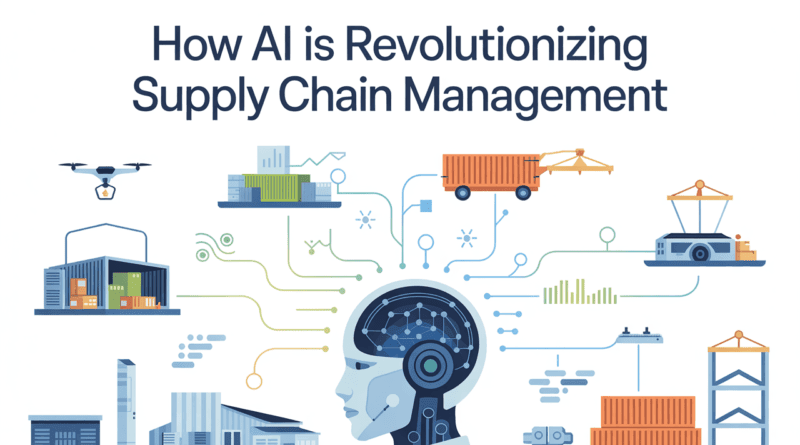How AI is Revolutionizing Supply Chain Management in 2026
Artificial intelligence (AI) is transforming industries worldwide, and supply chain management is no exception. With complex logistics, fluctuating demand, and the need for seamless coordination across multiple stakeholders, managing a supply chain has always been challenging. AI introduces new capabilities that enhance efficiency, reduce costs, and provide greater flexibility across supply chains. From predictive analytics to automation, AI is playing a pivotal role in how businesses operate and deliver products to their customers.
1. AI in Demand Forecasting
One of the most critical aspects of supply chain management is accurately predicting demand. Traditional methods of forecasting often rely on historical data and basic statistical models. However, these models can be limited, especially when dealing with sudden shifts in market trends, consumer behavior, or unforeseen events like pandemics.
AI, powered by machine learning, enhances demand forecasting by analyzing massive datasets from a variety of sources—sales data, market trends, weather patterns, and even social media activities. These algorithms can adapt and improve their predictions over time, offering a more dynamic and accurate view of future demand.
Benefits of AI-Enhanced Forecasting:
- Reduced Inventory Costs: By predicting demand more accurately, companies can avoid overstocking or understocking, optimizing their inventory levels.
- Improved Customer Satisfaction: Meeting demand precisely ensures that customers receive their orders on time, reducing delays and backorders.
- Agility in Response: With AI-driven forecasting, companies can react more quickly to market changes, whether it’s a surge in demand for a specific product or a sudden drop in supply due to a natural disaster.
For example, Amazon uses AI-powered systems to anticipate customer demand, allowing them to efficiently stock and distribute products across their global network. This reduces lead times and helps manage inventory more effectively.
2. Automation in Logistics and Warehousing
AI has also revolutionized logistics and warehouse management through automation. From robotics that handle picking and packing to AI algorithms that optimize shipping routes, automation is speeding up processes and reducing human error.
Robotics and AI in Warehousing
In modern warehouses, AI-powered robots are increasingly used to automate repetitive tasks such as sorting, picking, packing, and transporting goods. These robots are equipped with sensors, cameras, and AI algorithms to navigate around the warehouse, identifying products, and fulfilling orders faster than humans.
Optimizing Routes with AI
AI is also transforming logistics by optimizing delivery routes. Machine learning algorithms can analyze factors such as traffic patterns, weather conditions, and fuel efficiency to determine the most effective routes for delivery vehicles. This optimization minimizes delivery times, reduces fuel costs, and improves overall efficiency.
For example, UPS utilizes AI to optimize its delivery routes using a system called ORION (On-Road Integrated Optimization and Navigation). ORION uses machine learning to calculate the most efficient route for each driver based on real-time conditions, saving the company millions in fuel costs.
3. AI in Supplier Relationship Management
Managing relationships with suppliers is another critical component of supply chain management. AI enables companies to improve supplier management by monitoring supplier performance, predicting potential risks, and identifying alternative suppliers when needed.
Predictive Supplier Risk Analysis
AI-powered tools can analyze supplier data and market conditions to predict potential disruptions, such as supplier bankruptcies, natural disasters, or geopolitical tensions. These predictive capabilities enable businesses to take proactive measures, such as identifying alternative suppliers or securing additional inventory, to mitigate the risk of supply chain disruptions.
Real-Time Supplier Performance Tracking
AI also allows companies to monitor supplier performance in real-time, tracking key performance indicators (KPIs) such as delivery times, product quality, and cost efficiency. By analyzing this data, AI can identify underperforming suppliers and recommend alternatives or negotiations to ensure that supply chain operations remain smooth.
4. Enhanced Transparency with Blockchain and AI
One of the biggest challenges in global supply chains is the lack of transparency. Consumers and businesses alike are demanding more visibility into where products come from, how they are made, and how they are transported. AI, combined with blockchain technology, is helping to improve transparency and traceability across supply chains.
AI-Driven Blockchain Integration
AI can process and analyze the large amounts of data captured on a blockchain, helping businesses track the origin, movement, and handling of products from raw materials to finished goods. This is particularly important in industries such as food and pharmaceuticals, where consumers and regulators demand assurance about the quality and safety of products.
Blockchain, when combined with AI, provides an immutable and transparent ledger of transactions, ensuring that businesses can verify the authenticity and ethical sourcing of their products. AI algorithms can monitor these transactions for anomalies, automatically flagging suspicious activities such as fraud or counterfeit goods.
For example, Walmart has partnered with IBM to develop a blockchain-based system that tracks the origins of food products in its supply chain. The use of AI and blockchain has enabled Walmart to trace the journey of a food item from farm to shelf in seconds, improving food safety and reducing waste.
5. AI-Driven Sustainability in Supply Chains
Sustainability is becoming an increasingly important focus for businesses. Consumers are more environmentally conscious, and companies are under pressure to reduce their carbon footprints. AI can play a crucial role in helping businesses make their supply chains more sustainable by optimizing resource use, reducing waste, and lowering emissions.
AI in Sustainable Sourcing
AI can help businesses identify sustainable suppliers and materials, analyzing factors such as carbon emissions, energy consumption, and environmental impact. By prioritizing sustainable options, businesses can minimize their ecological footprint while maintaining efficiency.
AI-Optimized Transportation
AI can also optimize transportation routes to reduce fuel consumption and emissions. By analyzing data on traffic patterns, vehicle efficiency, and delivery schedules, AI can recommend the most eco-friendly routes for delivery vehicles. This not only reduces costs but also helps businesses meet sustainability goals.
Circular Supply Chains
AI can facilitate the shift towards circular supply chains, where waste is minimized, and products are reused or recycled at the end of their lifecycle. AI systems can analyze product data to determine when items can be refurbished or repurposed, helping companies reduce waste and extend the life of their products.
6. Future Trends in AI and Supply Chain Management
As AI technology continues to evolve, the future of supply chain management will see even more advanced applications. Some emerging trends include:
AI-Powered Autonomous Vehicles
Autonomous vehicles, including trucks and drones, are set to revolutionize logistics and delivery. AI will play a key role in powering these vehicles, enabling them to navigate complex environments, optimize routes, and deliver goods without human intervention.
AI in Supplier Collaboration
AI can facilitate closer collaboration between suppliers and businesses by automating communication and decision-making processes. AI systems can automatically negotiate contracts, place orders, and manage inventory, reducing the need for human intervention in day-to-day supply chain operations.
Hyper-Automation in Warehouses
AI, combined with robotics and the Internet of Things (IoT), will drive hyper-automation in warehouses, where every aspect of inventory management, picking, packing, and shipping is fully automated. This will significantly reduce labor costs while increasing efficiency.
Conclusion
AI is revolutionizing supply chain management by improving demand forecasting, automating logistics, enhancing transparency, and promoting sustainability. While these advancements offer substantial benefits, they also pose challenges, such as the need for data privacy and the potential for job displacement. As AI continues to evolve, businesses must strike a balance between leveraging the power of AI and ensuring ethical, responsible implementation. By doing so, AI has the potential to reshape supply chain management, making it more efficient, transparent, and sustainable than ever before.
more tools on www.maniabits.com





